Tổng hợp lý thuyết xét đoán và ra quyết định trong kiểm toán
Nghiên cứu xét đoán và ra quyết định (JDM) ngày càng trở
nên quan trọng trong lý thuyết JDM nói chung, lý thuyết kiểm
toán và thực hành kiểm toán. Bài viết tổng hợp các nghiên cứu
trước nhằm cung cấp bức tranh khái quát về lý thuyết JDM trong
kiểm toán, từ đó đưa ra các gợi ý cho nghiên cứu tương lai. Kế
thừa danh mục các nghiên cứu JDM trong kiểm toán đã công bố
đến năm 2010 của (Mala & Chand, 2015), nghiên cứu này còn bổ
sung các nghiên cứu liên quan từ 2010 đến 2019 trên 10 tạp chí
khoa học kế toán và kiểm toán. Sử dụng phương pháp phân tích
nội dung để phân tích 244 nghiên cứu đã chọn lọc, bài viết tổng
hợp lý thuyết JDM trong kiểm toán theo các chủ đề gồm con
người (kiểm toán viên), nhiệm vụ kiểm toán và môi trường qua
từng giai đoạn thuộc hơn nửa thế kỷ vừa qua. Kết quả nghiên cứu
cung cấp định hướng cho nghiên cứu tiếp theo về JDM trong kiểm
toán, về các yếu tố ảnh hưởng đến việc thực hiện xét đoán và ra
quyết định của Kiểm Toán Viên (KTV), và chỉ ra điểm mạnh, hạn
chế của phương pháp phòng thí nghiệm được sử dụng phổ biến
trong lý thuyết này.
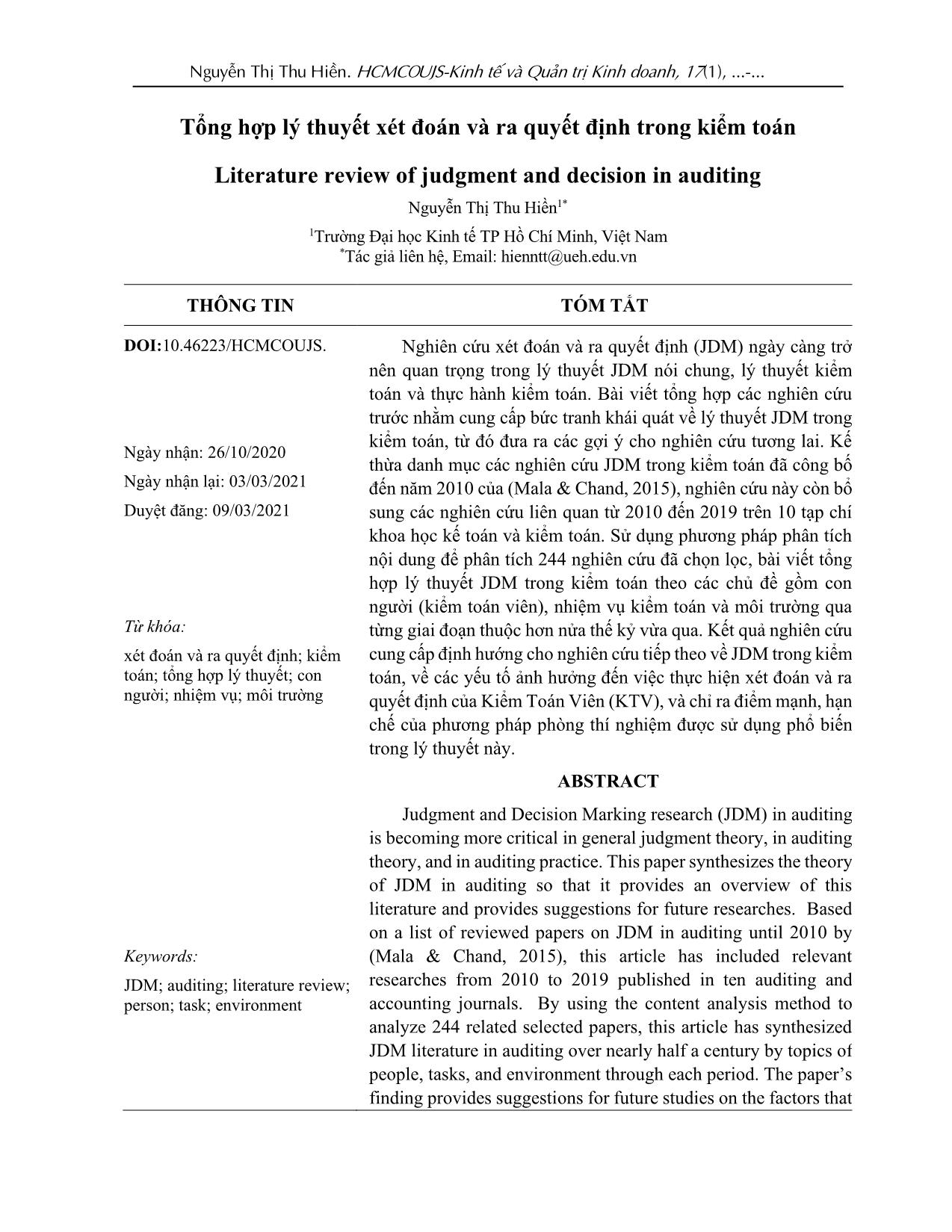
Trang 1
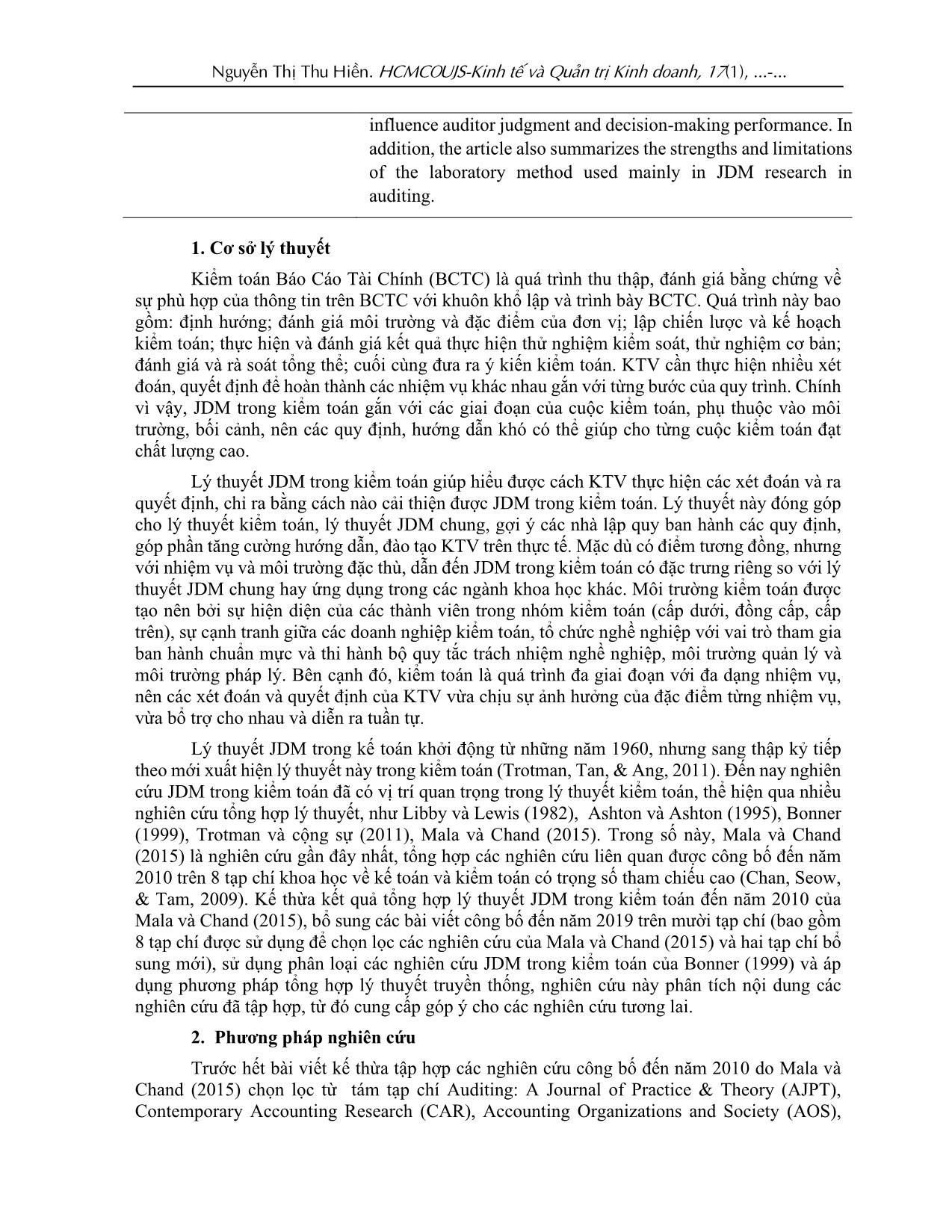
Trang 2
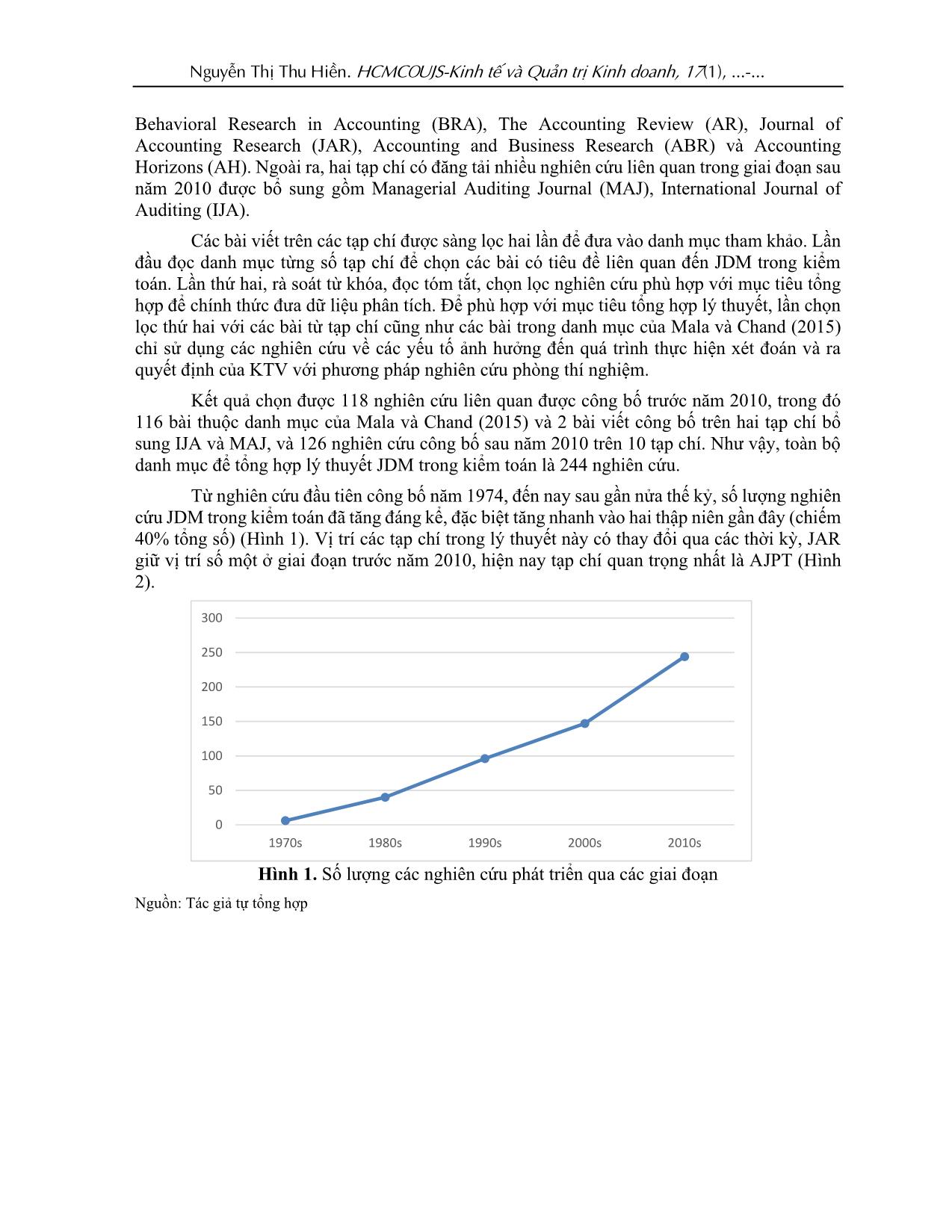
Trang 3
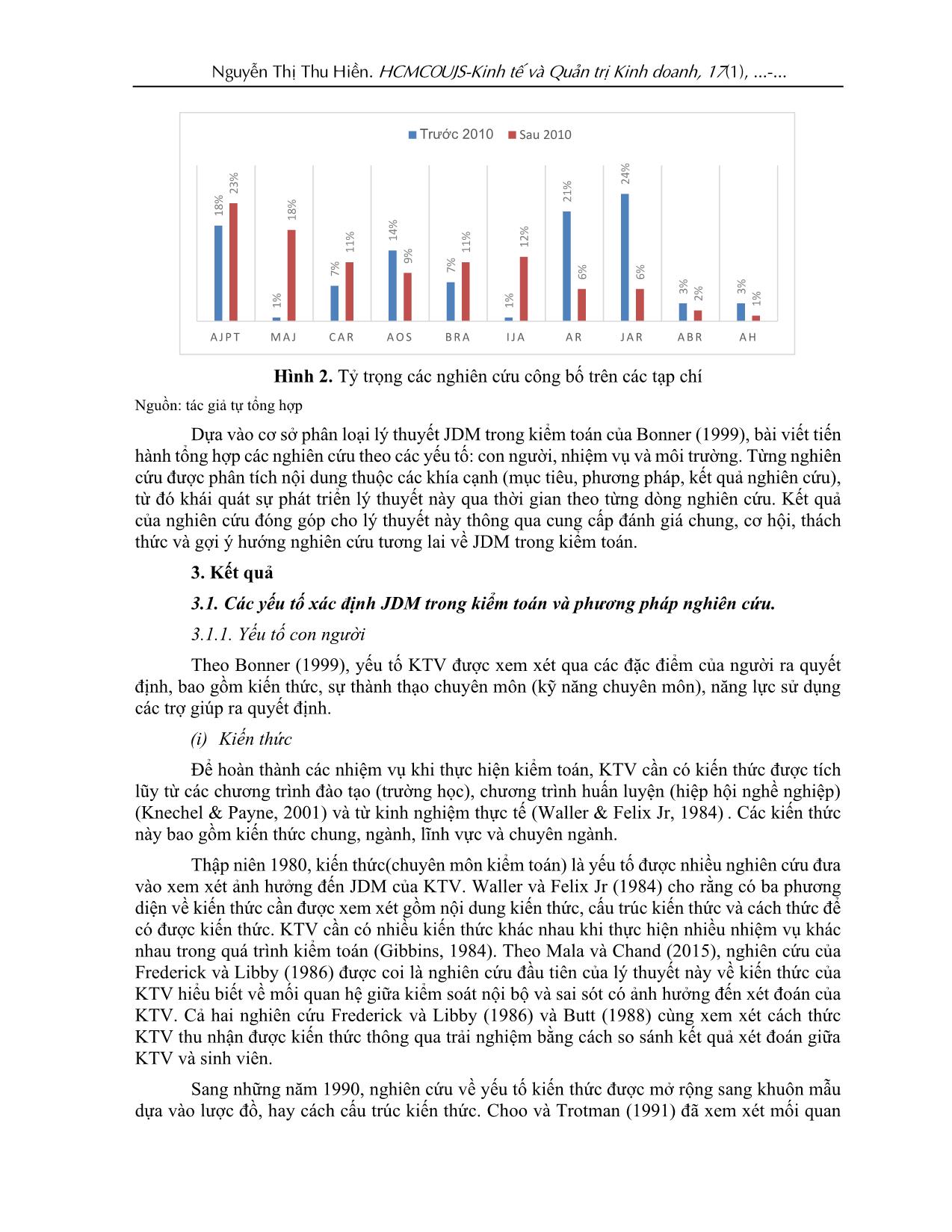
Trang 4
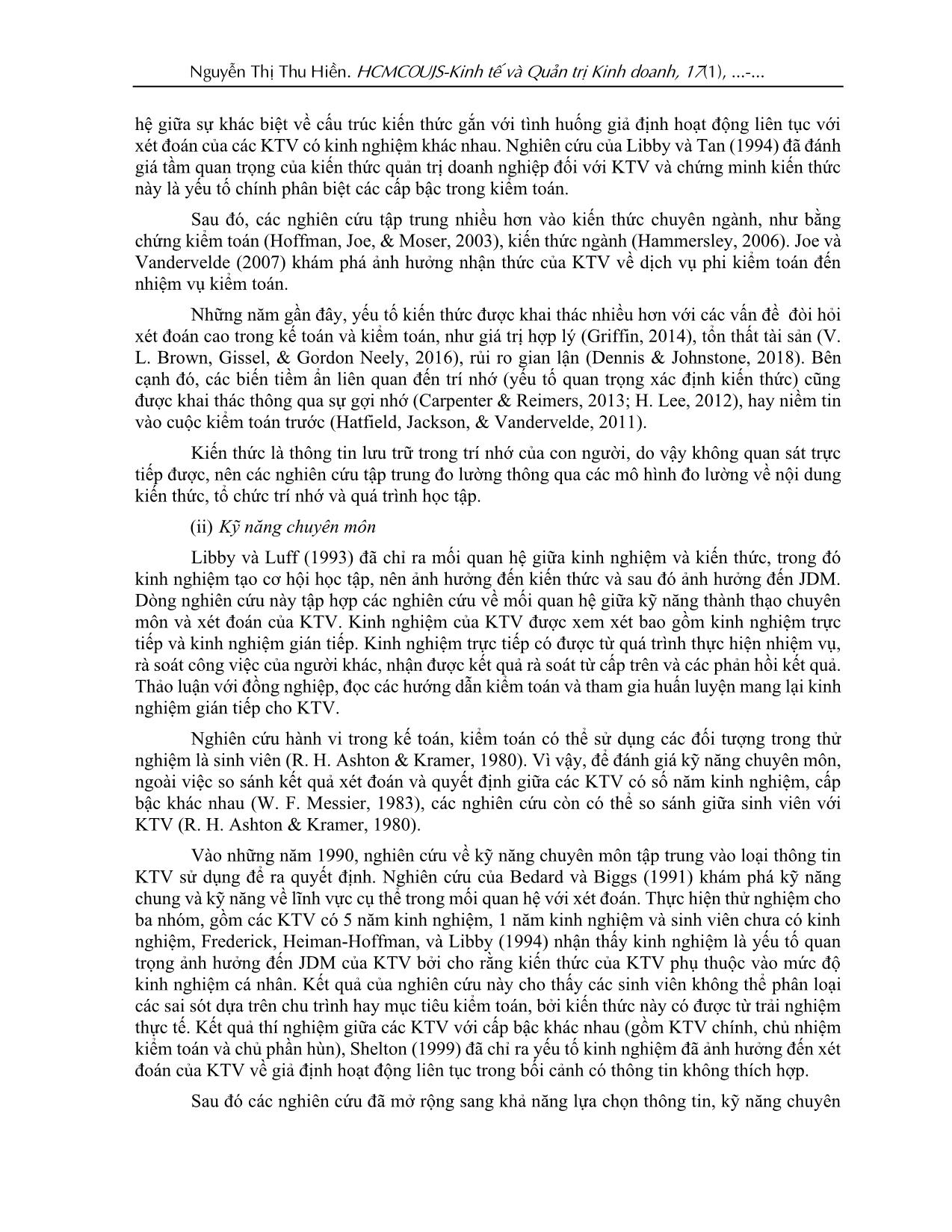
Trang 5
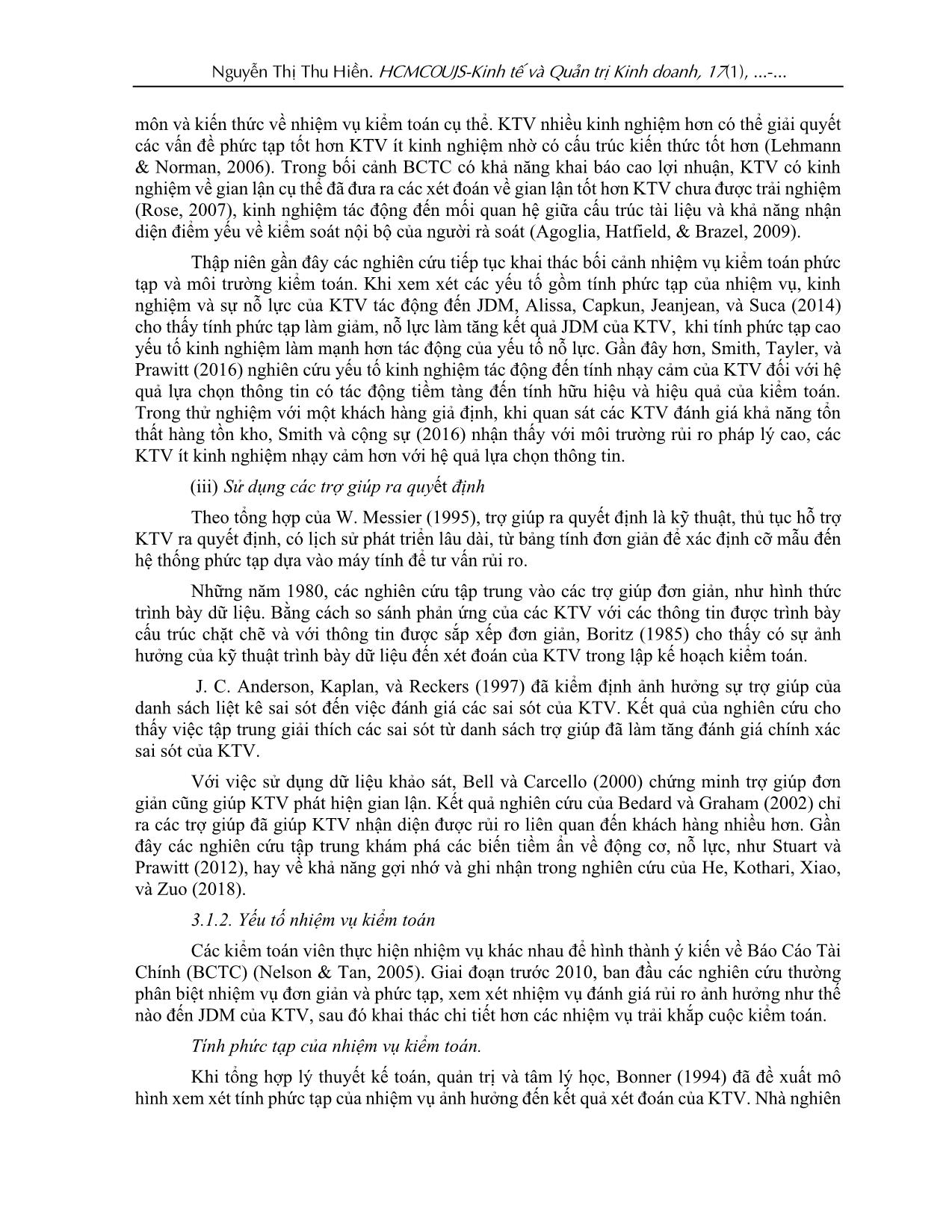
Trang 6
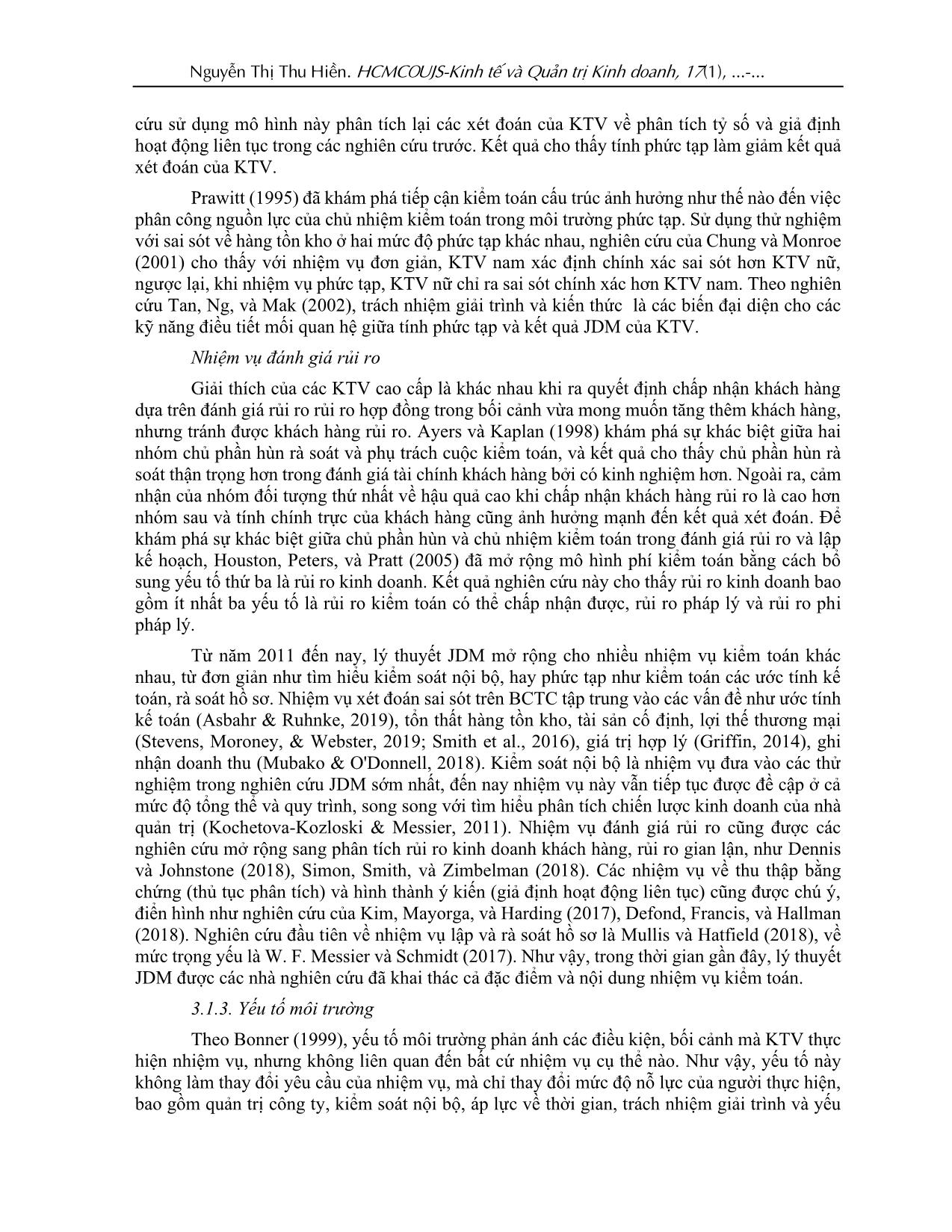
Trang 7
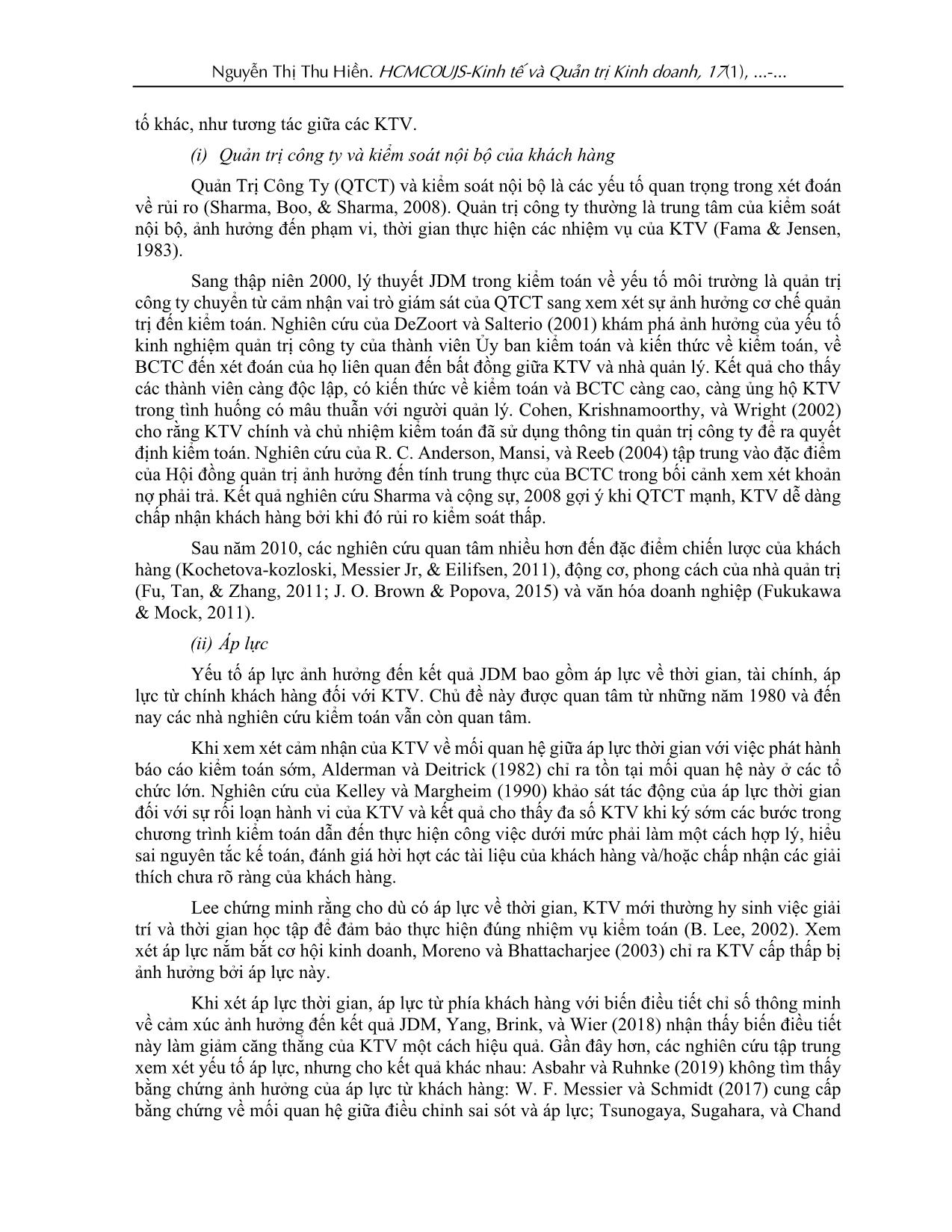
Trang 8
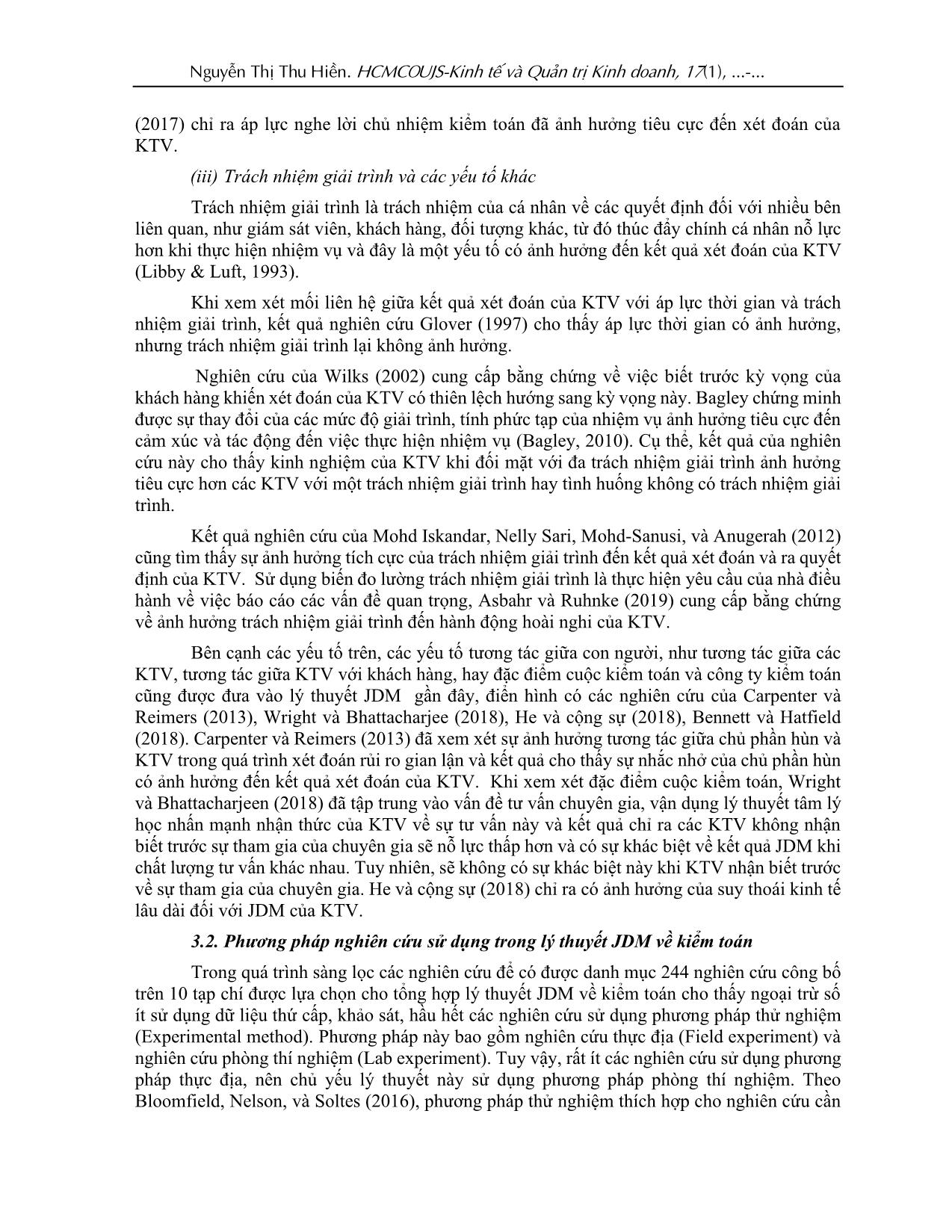
Trang 9
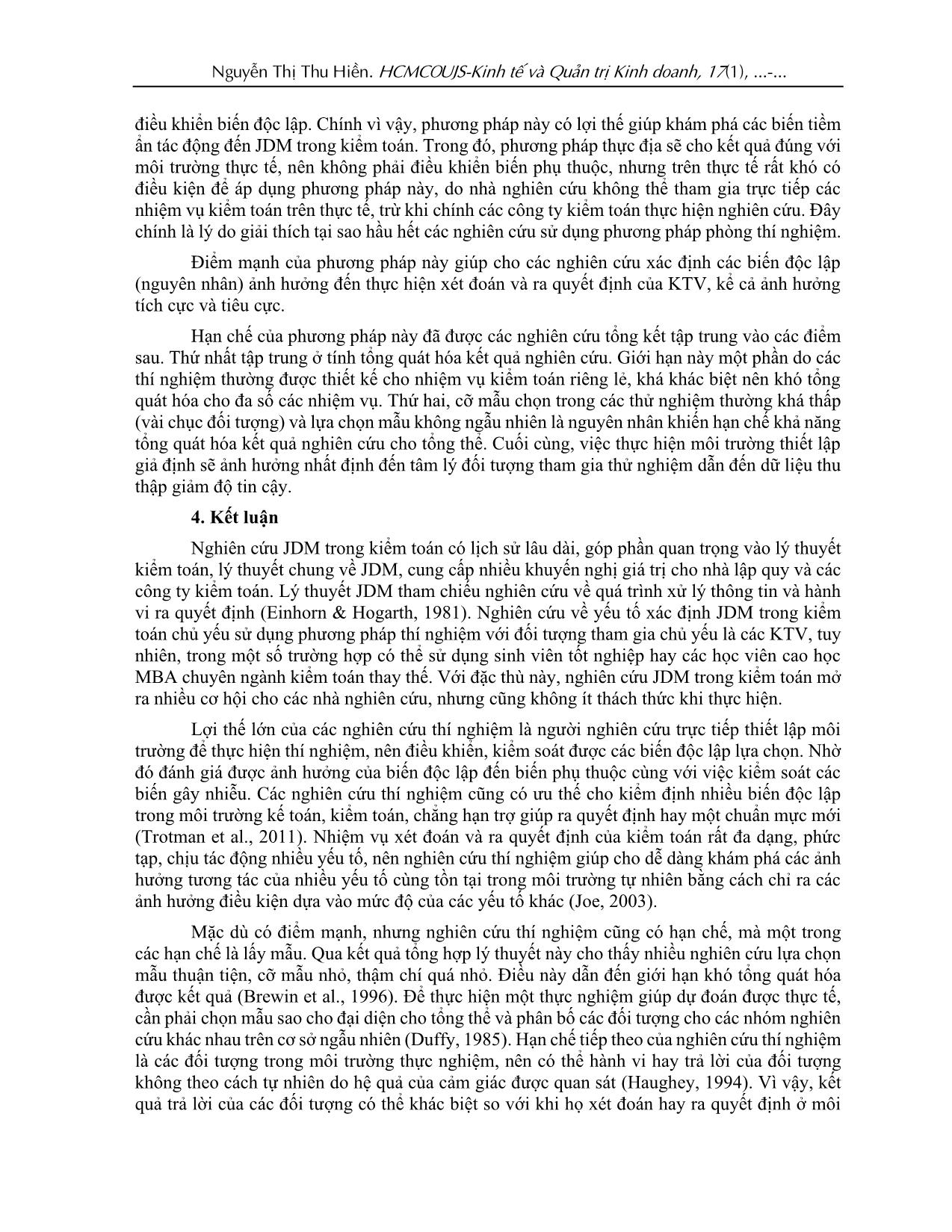
Trang 10
Tải về để xem bản đầy đủ
Tóm tắt nội dung tài liệu: Tổng hợp lý thuyết xét đoán và ra quyết định trong kiểm toán
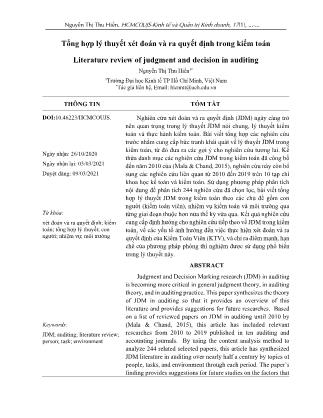
Nguyễn Thị Thu Hiền. HCMCOUJS-Kinh tế và Quản trị Kinh doanh, 17(1), ...-... Tổng hợp lý thuyết xét đoán và ra quyết định trong kiểm toán Literature review of judgment and decision in auditing Nguyễn Thị Thu Hiền1* 1Trường Đại học Kinh tế TP Hồ Chí Minh, Việt Nam *Tác giả liên hệ, Email: hienntt@ueh.edu.vn THÔNG TIN TÓM TẮT DOI:10.46223/HCMCOUJS. Ngày nhận: 26/10/2020 Ngày nhận lại: 03/03/2021 Duyệt đăng: 09/03/2021 Từ khóa: xét đoán và ra quyết định; kiểm toán; tổng hợp lý thuyết; con người; nhiệm vụ; môi trường Keywords: JDM; auditing; literature review; person; task; environment Nghiên cứu xét đoán và ra quyết định (JDM) ngày càng trở nên quan trọng trong lý thuyết JDM nói chung, lý thuyết kiểm toán và thực hành kiểm toán. Bài viết tổng hợp các nghiên cứu trước nhằm cung cấp bức tranh khái quát về lý thuyết JDM trong kiểm toán, từ đó đưa ra các gợi ý cho nghiên cứu tương lai. Kế thừa danh mục các nghiên cứu JDM trong kiểm toán đã công bố đến năm 2010 của (Mala & Chand, 2015), nghiên cứu này còn bổ sung các nghiên cứu liên quan từ 2010 đến 2019 trên 10 tạp chí khoa học kế toán và kiểm toán. Sử dụng phương pháp phân tích nội dung để phân tích 244 nghiên cứu đã chọn lọc, bài viết tổng hợp lý thuyết JDM trong kiểm toán theo các chủ đề gồm con người (kiểm toán viên), nhiệm vụ kiểm toán và môi trường qua từng giai đoạn thuộc hơn nửa thế kỷ vừa qua. Kết quả nghiên cứu cung cấp định hướng cho nghiên cứu tiếp theo về JDM trong kiểm toán, về các yếu tố ảnh hưởng đến việc thực hiện xét đoán và ra quyết định của Kiểm Toán Viên (KTV), và chỉ ra điểm mạnh, hạn chế của phương pháp phòng thí nghiệm được sử dụng phổ biến trong lý thuyết này. ABSTRACT Judgment and Decision Marking research (JDM) in auditing is becoming more critical in general judgment theory, in auditing theory, and in auditing practice. This paper synthesizes the theory of JDM in auditing so that it provides an overview of this literature and provides suggestions for future researches. Based on a list of reviewed papers on JDM in auditing until 2010 by (Mala & Chand, 2015), this article has included relevant researches from 2010 to 2019 published in ten auditing and accounting journals. By using the content analysis method to analyze 244 related selected papers, this article has synthesized JDM literature in auditing over nearly half a century by topics of people, tasks, and environment through each period. The paper’s finding provides suggestions for future studies on the factors that Nguyễn Thị Thu Hiền. HCMCOUJS-Kinh tế và Quản trị Kinh doanh, 17(1), ...-... influence auditor judgment and decision-making performance. In addition, the article also summarizes the strengths and limitations of the laboratory method used mainly in JDM research in auditing. 1. Cơ sở lý thuyết Kiểm toán Báo Cáo Tài Chính (BCTC) là quá trình thu thập, đánh giá bằng chứng về sự phù hợp của thông tin trên BCTC với khuôn khổ lập và trình bày BCTC. Quá trình này bao gồm: định hướng; đánh giá môi trường và đặc điểm của đơn vị; lập chiến lược và kế hoạch kiểm toán; thực hiện và đánh giá kết quả thực hiện thử nghiệm kiểm soát, thử nghiệm cơ bản; đánh giá và rà soát tổng thể; cuối cùng đưa ra ý kiến kiểm toán. KTV cần thực hiện nhiều xét đoán, quyết định để hoàn thành các nhiệm vụ khác nhau gắn với từng bước của quy trình. Chính vì vậy, JDM trong kiểm toán gắn với các giai đoạn của cuộc kiểm toán, phụ thuộc vào môi trường, bối cảnh, nên các quy định, hướng dẫn khó có thể giúp cho từng cuộc kiểm toán đạt chất lượng cao. Lý thuyết JDM trong kiểm toán giúp hiểu được cách KTV thực hiện các xét đoán và ra quyết định, chỉ ra bằng cách nào cải thiện được JDM trong kiểm toán. Lý thuyết này đóng góp cho lý thuyết kiểm toán, lý thuyết JDM chung, gợi ý các nhà lập quy ban hành các quy định, góp phần tăng cường hướng dẫn, đào tạo KTV trên thực tế. Mặc dù có điểm tương đồng, nhưng với nhiệm vụ và môi trường đặc thù, dẫn đến JDM trong kiểm toán có đặc trưng riêng so với lý thuyết JDM chung hay ứng dụng trong các ngành khoa học khác. Môi trường kiểm toán được tạo nên bởi sự hiện diện của các thành viên trong nhóm kiểm toán (cấp dưới, đồng cấp, cấp trên), sự cạnh tranh giữa các doanh nghiệp kiểm toán, tổ chức nghề nghiệp với vai trò tham gia ban hành chuẩn mực và thi hành bộ quy tắc trách nhiệm nghề nghiệp, môi trường quản lý và môi trường pháp lý. Bên cạnh đó, kiểm toán là quá trình đa giai đoạn với đa dạng nhiệm vụ, nên các xét đoán và quyết định của KTV vừa chịu sự ảnh hưởng của đặc điểm từng nhiệm vụ, vừa bổ trợ cho nhau và diễn ra tuần tự. Lý thuyết JDM trong kế toán khởi động từ những năm 1960, nhưng sang thập kỷ tiếp theo mới xuất hiện lý thuyết này trong kiểm toán (Trotman, Tan, & Ang, 2011). Đến nay nghiên cứu JDM trong kiểm toán đã có vị trí quan trọng trong lý thuyết kiểm toán, thể hiện qua nhiều nghiên cứu tổng hợp lý thuyết, ... 1016/j.jacceco.2004.01.004 Asbahr, K., & Ruhnke, K. (2019). Real effects of reporting key audit matters on auditors' judgment and choice of action. International Journal of Auditing, 23(2), 165-180. doi:10.1111/ijau.12154 Ashton, R. H., & Ashton, A. H. (1995). Perspectives on judgment and decision-making research in accounting and auditing. In R. H. Ashton & A. H. Ashton (Eds.), Judgment and decision-making research in accounting and auditing (pp. 3-25). New York, NY: Cambridge University Press Ashton, R. H., & Kramer, S. S. (1980). Students as surrogates in behavioral accounting research: Some evidence. Journal of Accounting Research, 18(1), 1-15. Ayers, S., & Kaplan, S. E. (1998). Potential differences between engagement and risk review partners and their effect on client acceptance judgments. Accounting Horizons, 12(2), 139. Nguyễn Thị Thu Hiền. HCMCOUJS-Kinh tế và Quản trị Kinh doanh, 17(1), ...-... Bagley, P. L. (2010). Negative affect: A consequence of multiple accountabilities in auditing. AUDITING: A Journal of Practice & Theory, 29(2), 141-157. doi:10.2308/aud.2010.29.2.141 Bedard, J. C., & Biggs, S. F. (1991). Pattern recognition, hypotheses generation, and auditor performance in an analytical task. Accounting Review, 66(3), 22-642. Bedard, J. C., & Graham, L. E. (2002). The effects of decision aid orientation on risk factor identification and audit test planning. AUDITING: A Journal of Practice & Theory, 21(2), 39-56. Bell, T. B., & Carcello, J. V. (2000). A decision aid for assessing the likelihood of fraudulent financial reporting. AUDITING: A Journal of Practice & Theory, 19(1), 169-184. Bennett, G. B., & Hatfield, R. C. (2018). Staff auditors' proclivity for computer-mediated communication with clients and its effect on skeptical behavior. Accounting, Organizations and Society, 68-69, 42-57. doi:10.1016/j.aos.2018.05.003 Bloomfield, R., Nelson, M. W., & Soltes, E. (2016). Gathering data for archival, field, survey, and experimental accounting research. Journal of Accounting Research, 54(2), 341-395. Bonner, S. E. (1994). A model of the effects of audit task complexity. Accounting, Organizations and Society, 19(3), 213-234. Bonner, S. E. (1999). Judgment and decision-making research in accounting. Accounting Horizons, 13(4), 385. Boritz, J. E. (1985). The effect of information presentation structures on audit planning and review judgments. Contemporary Accounting Research, 1(2), 193-218. Brewin, T., Thornton, H., Bradley, C., McPherson, K., Gore, S., Silverman, W., & Altman, D. (1996). Patients' preferences and randomised trials. The Lancet, 347(9008), 1118-1119. Brown, J. O., & Popova, V. K. (2015). The interplay of management incentives and audit committee communication on auditor judgment. Behavioral Research in Accounting, 28(1), 27-40. doi:10.2308/bria-51259 Brown, V. L., Gissel, J. L., & Gordon Neely, D. (2016). Audit quality indicators: Perceptions of junior-level auditors. Managerial Auditing Journal, 31(8/9), 949-980. doi:10.1108/maj-01-2016-1300 Butt, J. L. (1988). Frequency judgments in an auditing-related task. Journal of Accounting Research, 26(2), 315-330. Carpenter, T. D., & Reimers, J. L. (2013). Professional skepticism: The effects of a partner's influence and the level of fraud indicators on auditors' fraud judgments and actions. Behavioral Research in Accounting, 25(2), 45-69. doi:10.2308/bria-50468 Chan, K. C., Seow, G. S., & Tam, K. (2009). Ranking accounting journals using dissertation citation analysis: A research note. Accounting, Organizations and Society, 34(6/7), 875- 885. Choo, F., & Trotman, K. T. (1991). The relationship between knowledge structure and judgments for experienced and inexperienced auditors. Accounting Review, 66(3), 464- 485. Nguyễn Thị Thu Hiền. HCMCOUJS-Kinh tế và Quản trị Kinh doanh, 17(1), ...-... Chung, J., & Monroe, G. S. (2001). A research note on the effects of gender and task complexity on an audit judgment. Behavioral Research in Accounting, 13(1), 111-125. Cohen, J., Krishnamoorthy, G., & Wright, A. M. (2002). Corporate governance and the audit process. Contemporary Accounting Research, 19(4), 573-594. Defond, M. L., Francis, J. R., & Hallman, N. J. (2018). Awareness of SEC Enforcement and Auditor Reporting Decisions. Contemporary Accounting Research, 35(1), 277-313. doi:10.1111/1911-3846.12352 Dennis, S. A., & Johnstone, K. M. (2018). A natural field experiment examining the joint role of audit partner leadership and subordinates’ knowledge in fraud brainstorming. Accounting, Organizations and Society, 66, 14-28. doi:10.1016/j.aos.2018.02.001 DeZoort, F. T., & Salterio, S. E. (2001). The effects of corporate governance experience and financial‐reporting and audit knowledge on audit committee members' judgments. AUDITING: A Journal of Practice & Theory, 20(2), 31-47. Duffy, M. E. (1985). Designing nursing research: the qualitative‐quantitative debate. Journal of advanced nursing, 10(3), 225-232. Einhorn, H. J., & Hogarth, R. M. (1981). Behavioral decision theory: Processes of judgement and choice. Annual review of psychology, 32(1), 53-88. Fama, E. F., & Jensen, M. C. (1983). Separation of ownership and control. The journal of law and Economics, 26(2), 301-325. Frederick, D. M., Heiman-Hoffman, V. B., & Libby, R. (1994). The structure of auditors' knowledge of financial statement errors. Auditing, 13(1), 1-21. Frederick, D. M., & Libby, R. (1986). Expertise and auditors' judgments of conjunctive events. Journal of Accounting Research, 24(2), 270-290. Fu, H., Tan, H. T., & Zhang, J. (2011). Effect of auditor negotiation experience and client negotiating style on auditors' judgments in an auditor-client negotiation context. AUDITING: A Journal of Practice & Theory, 30(3), 225-237. doi:10.2308/ajpt-10114 Fukukawa, H., & Mock, T. J. (2011). Audit risk assessments using belief versus probability. AUDITING: A Journal of Practice & Theory, 30(1), 75-99. doi:10.2308/aud.2011.30.1.75 Gibbins, M. (1984). Propositions about the psychology of professional judgment in public accounting. Journal of Accounting Research, 22(1), 103-125. Glover, S. M. (1997). The influence of time pressure and accountability on auditors' processing of nondiagnostic information. Journal of Accounting Research, 35(2), 213-226. Griffin, J. B. (2014). The Effects of Uncertainty and Disclosure on Auditors' Fair Value Materiality Decisions. Journal of Accounting Research, 52(5), 1165-1193. doi:10.1111/1475-679x.12059 Hammersley, M. (2006). Philosophy's contribution to social science research on education. Journal of Philosophy of Education, 40(2), 273-286. Nguyễn Thị Thu Hiền. HCMCOUJS-Kinh tế và Quản trị Kinh doanh, 17(1), ...-... Hatfield, R. C., Jackson, S. B., & Vandervelde, S. D. (2011). The effects of prior auditor involvement and client pressure on proposed audit adjustments. Behavioral Research in Accounting, 23(2), 117-130. Haughey, B. (1994). Evaluating quantitative research designs: Part 1. Critical care nurse, 14(5), 100-102. He, X., Kothari, S., Xiao, T., & Zuo, L. (2018). Long-term impact of economic conditions on auditors' judgment. The Accounting Review, 93(6), 203-229. Hoffman, V. B., Joe, J. R., & Moser, D. V. (2003). The effect of constrained processing on auditors’ judgments. Accounting, Organizations and Society, 28(7/8), 699-714. doi:10.1016/s0361-3682(02)00068-5 Houston, R. W., Peters, M. F., & Pratt, J. H. (2005). Nonlitigation risk and pricing audit services. AUDITING: A Journal of Practice & Theory, 24(1), 37-53. Joe, J. R. (2003). Why press coverage of a client influences the audit opinion. Journal of Accounting Research, 41(1), 109-133. Joe, J. R., & Vandervelde, S. D. (2007). Do auditor‐provided nonaudit services improve audit effectiveness? Contemporary Accounting Research, 24(2), 467-487. Kelley, T., & Margheim, L. (1990). The impact of time budget pressure, personality, and leadership variables on dysfunctional auditor behavior. Auditing-A Journal Of Practice & Theory, 9(2), 21-42. Kim, S., Mayorga, D. M., & Harding, N. (2017). Can I interrupt you? Understanding and minimizing the negative effects of brief interruptions on audit judgment quality. International Journal of Auditing, 21(2), 198-211. doi:10.1111/ijau.12089 Knechel, W. R., & Payne, J. L. (2001). Additional evidence on audit report lag. AUDITING: A Journal of Practice & Theory, 20(1), 137-146. Kochetova-kozloski, N., Messier Jr, W. F., & Eilifsen, A. (2011). Improving auditors’ fraud judgments using a frequency response mode*. Contemporary Accounting Research, 28(3), 837-858. doi:10.1111/j.1911-3846.2011.01067.x Kochetova-Kozloski, N., & Messier, W. F. (2011). Strategic analysis and auditor risk judgments. AUDITING: A Journal of Practice & Theory, 30(4), 149-171. doi:10.2308/ajpt-10147 Lee, B. (2002). Professional socialisation, commercial pressures and junior staff's time- pressured irregular auditing—A contextual interpretation. The British Accounting Review, 34(4), 315-333. Lee, H. (2012). Incentive contracts and time pressure on audit judgment performance. Managerial Auditing Journal, 27(3), 263-283. doi:10.1108/02686901211207492 Lehmann, C. M., & Norman, C. S. (2006). The effects of experience on complex problem representation and judgment in auditing: An experimental investigation. Behavioral Research in Accounting, 18(1), 65-83. Libby, R., & Lewis, B. L. (1982). Human information processing research in accounting: The state of the art in 1982. Accounting, Organizations and Society, 7(3), 231-285. Nguyễn Thị Thu Hiền. HCMCOUJS-Kinh tế và Quản trị Kinh doanh, 17(1), ...-... Libby, R., & Luft, J. (1993). Determinants of judgment performance in accounting settings: Ability, knowledge, motivation, and environment. Accounting, Organizations and Society, 18(5), 425-450. Libby, R., & Tan, H.-T. (1994). Modeling the determinants of audit expertise. Accounting, Organizations and Society, 19(8), 701-716. Mala, R., & Chand, P. (2015). Judgment and decision‐making research in auditing and accounting: Future research implications of person, task, and environment perspective. Accounting Perspectives, 14(1), 1-50. Messier, W. (1995). Research in and development of audit decision aids. Judgment and Decision Making Research in Accounting and Auditing, 207-228. Messier, W. F. (1983). The effect of experience and firm type on materiality/disclosure judgments. Journal of Accounting Research, 21(2), 611-618. Messier, W. F., & Schmidt, M. (2017). Offsetting misstatements: The effect of misstatement distribution, quantitative materiality, and client pressure on auditors' judgments. The Accounting Review, 93(4), 335-357. doi:10.2308/accr-51954 Mohd Iskandar, T., Nelly Sari, R., Mohd‐Sanusi, Z., & Anugerah, R. (2012). Enhancing auditors' performance. Managerial Auditing Journal, 27(5), 462-476. doi:10.1108/02686901211227959 Moreno, K., & Bhattacharjee, S. (2003). The impact of pressure from potential client business opportunities on the judgments of auditors across professional ranks. AUDITING: A Journal of Practice & Theory, 22(1), 13-28. Mubako, G., & O'Donnell, E. (2018). Effect of fraud risk assessments on auditor skepticism: Unintended consequences on evidence evaluation. International Journal of Auditing, 22(1), 55-64. doi:10.1111/ijau.12104 Mullis, C. E., & Hatfield, R. C. (2018). The effects of multitasking on auditors’ judgment quality. Contemporary Accounting Research, 35(1), 314-333. doi:10.1111/1911- 3846.12392 Nelson, M., & Tan, H. T. (2005). Judgment and decision making research in auditing: A task, person, and interpersonal interaction perspective. AUDITING: A Journal of Practice & Theory, 24(s-1), 41-71. Prawitt, D. F. (1995). Staffing assignments for judgment-oriented audit tasks: The effects of structured audit technology and environment. Accounting Review, 70(3), 443-465. Rose, J. M. (2007). Attention to evidence of aggressive financial reporting and intentional misstatement judgments: Effects of experience and trust. Behavioral Research in Accounting, 19(1), 215-229. Sharma, D. S., Boo, E. F., & Sharma, V. D. (2008). The impact of non‐mandatory corporate governance on auditors’ client acceptance, risk and planning judgments. Accounting and Business Research, 38(2), 105-120. Shelton, S. W. (1999). The effect of experience on the use of irrelevant evidence in auditor judgment. The Accounting Review, 74(2), 217-224. Nguyễn Thị Thu Hiền. HCMCOUJS-Kinh tế và Quản trị Kinh doanh, 17(1), ...-... Simon, C. A., Smith, J. L., & Zimbelman, M. F. (2018). The influence of judgment decomposition on auditors' fraud risk assessments: Some trade-offs. The Accounting Review, 93(5), 273-291. doi:10.2308/accr-52024 Smith, S. D., Tayler, W. B., & Prawitt, D. F. (2016). The effect of information choice on auditors' judgments and confidence. Accounting Horizons, 30(3), 393-408. Stevens, E., Moroney, R., & Webster, J. (2019). Professional skepticism: The combined effect of partner style and team identity salience. International Journal of Auditing, 23(2), 279-291. doi:10.1111/ijau.12161 Stuart, I. C., & Prawitt, D. F. (2012). Firm-level formalization and auditor performance on complex tasks. Behavioral Research in Accounting, 24(2), 193-210. doi:10.2308/bria- 50113 Tan, H. T., Ng, T. B. P., & Mak, B. W. Y. (2002). The effects of task complexity on auditors' performance: The impact of accountability and knowledge. AUDITING: A Journal of Practice & Theory, 21(2), 81-95. Trotman, K. T., Tan, H. C., & Ang, N. (2011). Fifty-year overview of judgment and decision- making research in accounting. Accounting & Finance, 51(1), 278-360. doi:10.1111/j.1467-629X.2010.00398.x Tsunogaya, N., Sugahara, S., & Chand, P. (2017). The impact of social influence pressures, commitment, and personality on judgments by auditors: Evidence from Japan. Journal of International Accounting Research, 16(3), 17-34. Waller, W. S., & Felix Jr, W. I. (1984). The auditor and learning from experience: Some conjectures. Accounting, Organizations and Society, 9(3/4), 383-406. Wilks, T. J. (2002). Predecisional distortion of evidence as a consequence of real‐time audit review. The Accounting Review, 77(1), 51-71. Wright, N. S., & Bhattacharjee, S. (2018). Auditors' use of formal advice from internal firm subject matter experts: The impact of advice quality and advice awareness on auditors' judgments. Contemporary Accounting Research, 35(2), 980-1003. doi:10.1111/1911- 3846.12399 Yang, L., Brink, A. G., & Wier, B. (2018). The impact of emotional intelligence on auditor judgment. International Journal of Auditing, 22(1), 83-97. doi:10.1111/ijau.12106
File đính kèm:
 tong_hop_ly_thuyet_xet_doan_va_ra_quyet_dinh_trong_kiem_toan.pdf
tong_hop_ly_thuyet_xet_doan_va_ra_quyet_dinh_trong_kiem_toan.pdf

